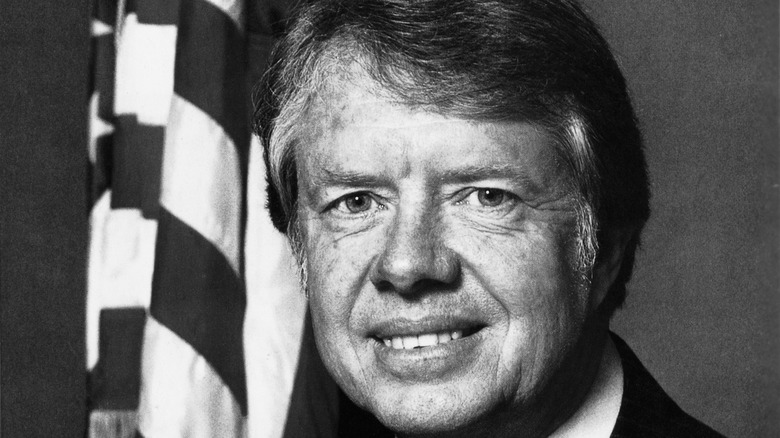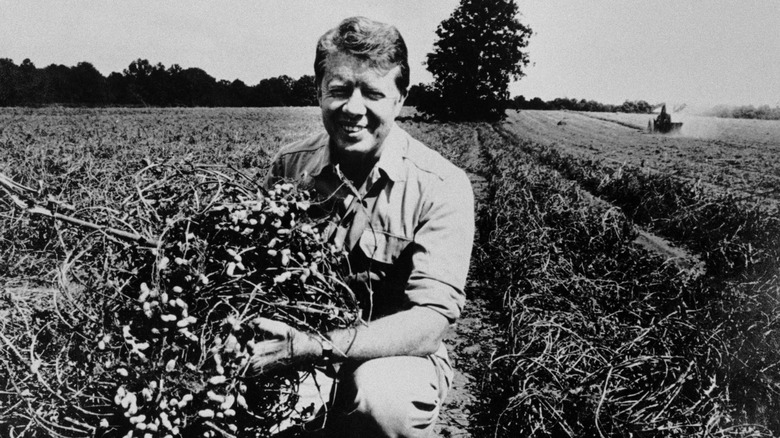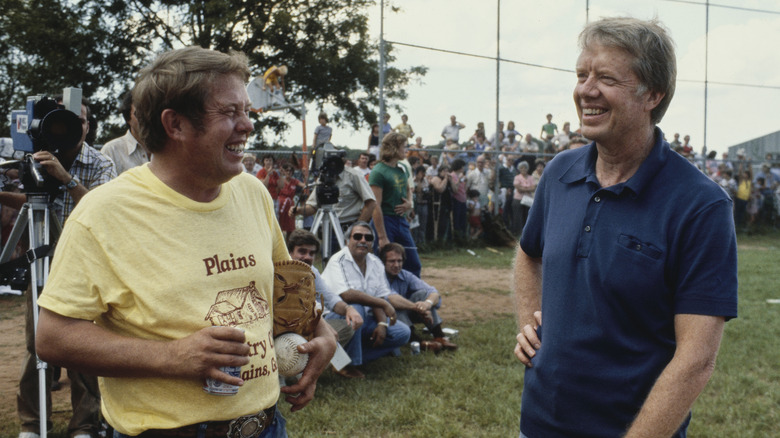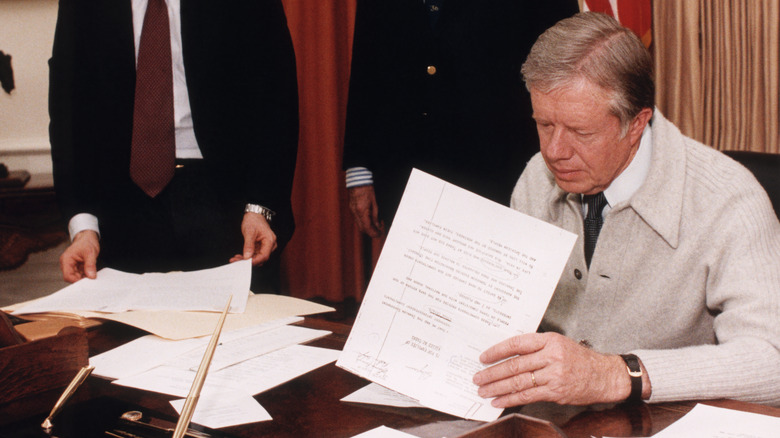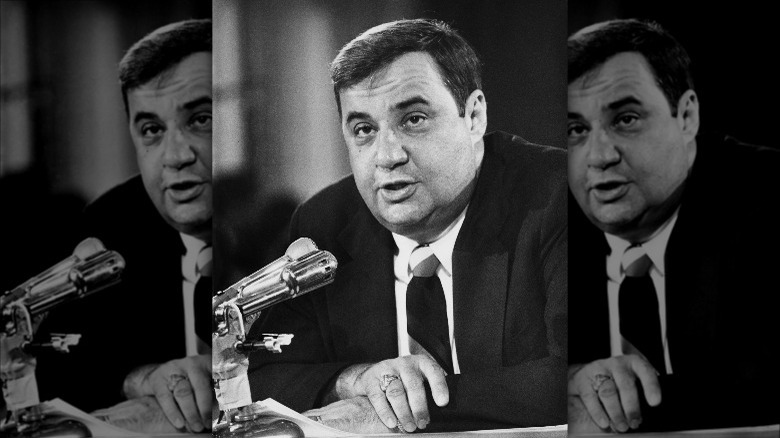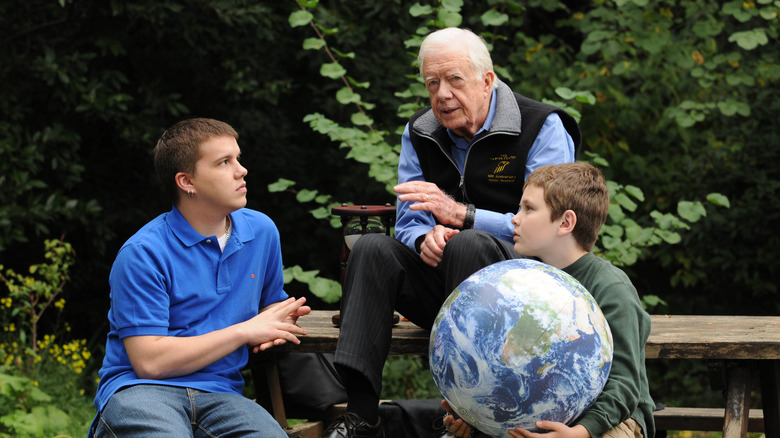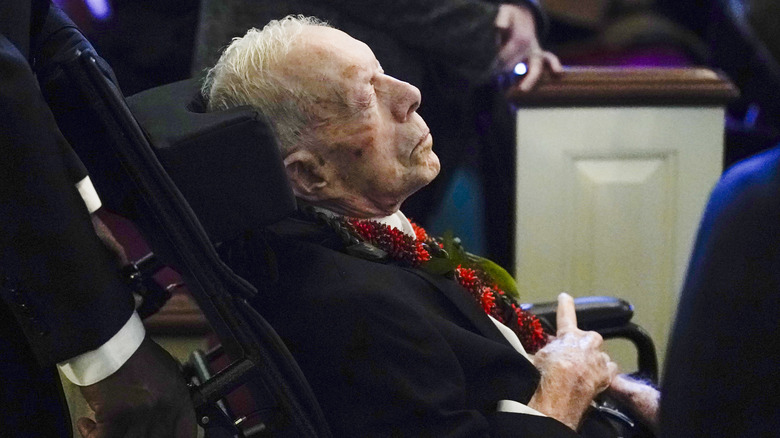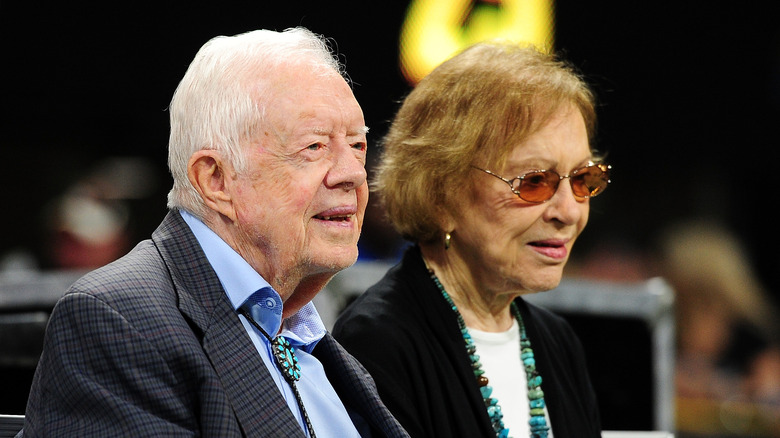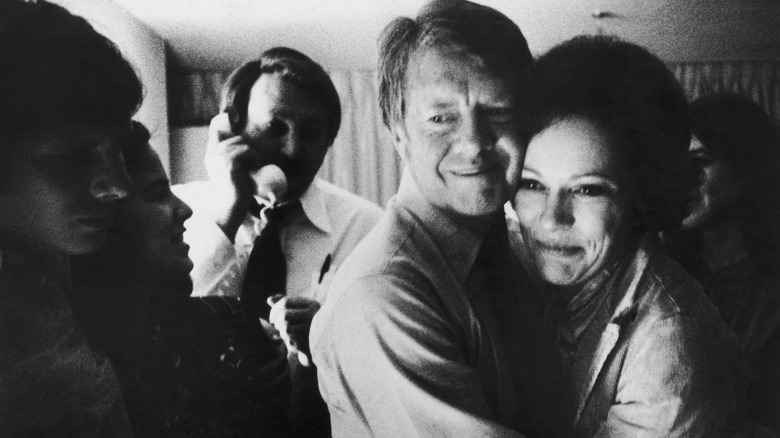The Tragedy Of Jimmy Carter Explained
When it comes to the 39th president of the United States, Jimmy Carter, there were some questionable things about his presidency – which preceded something of an odd political career after he left the White House. In short, his term was beset with a number of pretty big policy issues, both domestic and international. His handling of economic and energy problems led much of the country to think him indecisive, and there's also the whole matter of the Iran Hostage Crisis to discuss. The Carter administration was beset by misfortune at basically every turn, and that's putting it lightly.
But despite a rocky presidency, Carter managed an incredibly successful post-presidency life, working effectively as a diplomat all around the globe, taking part in humanitarian efforts — he basically dedicated his life to Habitat for Humanity – and establishing the Carter Center in Atlanta, Georgia. He was even awarded the Nobel Peace Prize in 2002, more than two decades after his term in office ended. And he did all of this while maintaining a happy marriage, living back in his small hometown of Plains, Georgia.
Overall, Carter has seemed rather content with his life, but that's not to say there weren't moments of tragedy, especially in more recent years. Here are some of those moments.
Leaving the Navy
While Jimmy Carter has plenty of accomplishments to his name as both the president of the United States and a well-known public figure, one of the main things you can learn about him is just how close he was with his wife, Rosalynn. That said, their marriage wasn't always smooth sailing.
Carter became a Naval officer shortly before their marriage in 1946, and while love was obviously a big factor there, Rosalynn also saw another opportunity: She could leave their small hometown and see the world. As she wrote in her 1984 memoir "First Lady from Plains," "I loved our life in the Navy ... I didn't want to live in Plains. I had left there, moved on." But things changed in 1953, when Carter's father died and he was faced with a choice: continue his career in the Navy, or move back to Georgia and run the family's peanut farm. He settled on the latter — and didn't consult Rosalynn on the matter. He's since come to regret making such a huge decision without Rosalynn's input, but that doesn't change what happened. According to Rosalynn, "I argued. I cried. I even screamed at him ... I thought the best part of my life had ended." During their trip back to Georgia, she didn't talk to him at all, only responding to him through their son.
All that said, though, the couple has also since recognized that their relationship blossomed from there, becoming what Carter called a "full partnership" that they could be proud of (via the Associated Press).
His younger brother's relationship with the media caused hardship
Jimmy Carter wrote in his memoir, "Keeping Faith," about his relationship with his younger brother Billy, mentioning the 13-year age gap between the two; they hardly knew each other until Carter had returned from his stint in the Navy. Nevertheless, the two seemed close as adults, and as Carter began his presidential campaign, Billy found himself not only in the spotlight, but thriving in it. The media just loved his quick wit.
Carter was concerned by the attention and what it would bring, writing in his diary in 1977, "I'm afraid that he might take something that's very attractive ... but then in a year or so it would be gone and he won't have any stability in his life." And as it turned out, those concerns weren't unfounded, with the press coming to wonder about Carter's potentially sketchy brother. The context? After a diplomatic trip to Libya, Billy made comments to the press that were perceived as antisemitic in nature, and the public turned on him in an instant, viewing his behavior as "peculiar" rather than charming, or painting his activities as actively harmful. Carter was suddenly inundated with questions, and the family worried when Billy acknowledged his alcoholism.
Now, to be clear, the family was very supportive, and Carter remains proud of his brother for seeking treatment, but he also mentions that the whole thing was hard. With the constant pressure, questions, and allegations from the media, Carter truly felt for his brother through that period.
The Iran Hostage Crisis
One of the most defining events of Jimmy Carter's presidency was arguably the Iran Hostage Crisis. Grunge has published a detailed explanation of the crisis, but here's the summary: In November 1979, the American Embassy in Tehran, Iran, was seized by students in the wake of revolution, and more than 50 Americans were held hostage for over a year. Carter's administration tried to diffuse the situation, but the entire incident — especially military failures like Operation Eagle Claw, one of the most expensive rescue missions ever – made the president and his advisors look ineffective.
A lot can be said about the politics and details of the Iran Hostage Crisis, but an aspect that's less discussed is Carter's own personal feelings on the topic. In his memoir "Keeping Faith," Carter explained that the crisis was the cause of some of the most difficult times in his entire life. Or, in his own words, as recorded in his diary: "These last few days have been among the worst I've ever spent in the White House." The hostages were on his mind at all hours, no matter what else he was working on at the time, and even though this was a diplomatic matter and he technically had no personal connection to the hostages, he still wrote, "I also had deep private feelings that were almost overwhelming." He'd read through all of the letters that came from the hostages at the embassy, learned about their lives and careers, and met personally with their families. For him, this was far beyond some dispassionate diplomatic incident, but closer to a personal tragedy that he desperately wanted to put right.
The Bert Lance affair
If you're looking for an internal scandal that cast something of a shadow over Jimmy Carter's presidency, then you need look no further than Bert Lance. As the story goes, Lance was a banker from Georgia and a close friend of Carter from before his presidency. Upon being elected, Carter brought Lance along to head up the Office of Management and Budget, but despite Lance's friendly attitude, criticisms started flying his way fairly quickly. Most notably, he was accused of misusing bank funds for his own purposes, and he ultimately resigned from his position due to the scrutiny after less than a year.
Carter was far from pleased about the whole thing, though, explaining in "Keeping Faith" that he not only depended heavily on Lance's support, but also saw him as a very close friend. His writings are critical of the press, explaining that reporters were riding a high after Watergate; finding anything scandalous, regardless of whether it was true or not, was a dream come true. Lance just happened to be the one they targeted.
Carter, in the meantime, experienced a rare sleepless night over the whole affair, and went through some rough discussions. Lance himself actually agreed that resignation was the smart move, but his wife LaBelle disagreed harshly. As Carter explained, "LaBelle called to say that, in accepting his resignation, I had betrayed my best friend." Carter understood where she was coming from and went on to note that the day was "probably one of the worst days I've ever spent."
The death of his grandson
The Carter family suffered an unexpected tragedy in December 2015: the death of Jimmy Carter's 28-year-old grandson, Jeremy Carter. In a devastating blog post, Jeremy's brother, Josh Carter, wrote about his fear and grief in raw detail, from his mother performing CPR on Jeremy after finding that his heart had stopped due to a sudden heart attack, to seeing him in the ER, hooked up to IVs and syringes for the entire night, to the alarm when Jeremy's heart stopped again, with 10 minutes of CPR doing nothing to restart it. And the grief, the denial, when he died: "Just this one time can the facts not be true. I want the universe to lie to me. Just this once." That's just a few sentences from the post.
The cause behind the heart attack has been kept private, though Josh mentioned that his brother had gone through a bunch of tests in recent months. Jeremy had been prescribed vitamins to help him eat and stop his legs from aching, but there was no mention of a problem with his heart.
As for Jimmy Carter, he announced the tragedy during his Sunday school lecture, saying that Jeremy was "a very special child" (via NBC News) and speaking about a conversation they'd had many years back while on a ski trip. As he recounted, Jeremy had asked, "Papa, are you going to die someday? ... When you die, can we still come to [this] place?"
Entering hospice care
Over the years, there've been various pieces of news about Jimmy Carter's health, including reports that he was receiving treatment for liver cancer and melanoma back in 2015. But despite those reports, he managed to bounce back, announcing that he was cancer free just a few months later. In the following years, he underwent a few short hospital stays — for reasons that haven't been made public — and on February 18, 2023, The Carter Center released a statement saying that the former president had elected to enter hospice care.
Chip Carter — Jimmy Carter's son — later told the press that the decision filled his father with doubts that he'd never expected. Most notably, he was concerned what would happen if he died before his wife, Rosalynn Carter. Chip explained, "Dad told me several times over the last nine months that he had always thought he would outlive Mom and protect her until she passed, but that now he wasn't sure that was going to happen — and that upset him" (via CBS News).
Despite that, in February 2024, media outlets were flooded with incredible stories: Carter was still alive — and had even made public appearances — a year after entering hospice care. He was defying all odds (those in hospice typically have about six months left to live, but rarely live that long), but at the same time, living so long ultimately brought about different tragedies instead.
Rosalynn Carter's dementia diagnosis
In late May 2023, The Carter Center released a statement from the family saying that Rosalynn Carter had been diagnosed with dementia. The statement continued, explaining, "She continues to live happily at home with her husband, enjoying spring in Plains and visits with loved ones." There weren't many further details provided in the statement; rather, it highlighted how Rosalynn had championed mental health for years, and that there was hope the statement would continue to open up those conversations.
But later that year, in August, Josh Carter — the couple's grandson — gave an interview with People Magazine, saying that both of them were enjoying their time together, constantly with their family. Both of them were, for the most part, still very much themselves, and even if Rosalynn was having a hard time with her memory, she was "still able to form new memories."
That said, Josh also spoke about what it must be like for his grandfather, saying it's "gotta be hard" for him. Being by the side of the person you love while they lose their memory — the tragedy inherent in that hardly needs to be explained. All the same, Josh made sure to mention that his grandparents had not only lived a full life together, but also, "They are still holding hands ... it's just amazing."
Rosalynn Carter died in late 2023
Just a handful of months after releasing a statement that Rosalynn Carter had been diagnosed with dementia, on November 17, 2023, The Carter Center released another statement, explaining that the former first lady had entered hospice care. Only a couple days later, on November 19, another statement was released: Rosalynn Carter had died at the age of 96, surrounded by her family.
The Carters' son Chip Carter later spoke to the press about how hard it had been for his father, recounting that the night before, Jimmy Carter had sat at Rosalynn's side, telling her how much he loved her and holding her hand before asking to have time alone with her. "I'm sure he was praying," Chip went on to explain (via CBS News). The next morning, after Rosalynn's death, Carter asked once again that he be left alone with his wife.
The two of them were a devoted couple, and excerpts from their letters provide a picture of a deeply affectionate partnership. And so nothing paints the tragedy more clearly than Carter's own words, which were included in the initial statement: "Rosalynn was my equal partner in everything I ever accomplished ... She gave me wise guidance and encouragement when I needed it. As long as Rosalynn was in the world, I always knew somebody loved and supported me."
If you or anyone you know needs help with addiction issues, help is available. Visit the Substance Abuse and Mental Health Services Administration website or contact SAMHSA's National Helpline at 1-800-662-HELP (4357).
